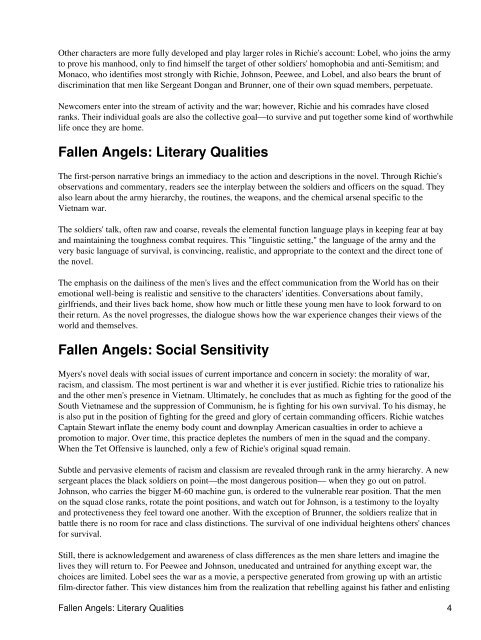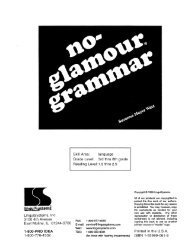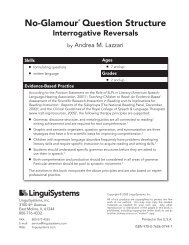Fallen Angels - Millbury Public Schools Community Portal
Fallen Angels - Millbury Public Schools Community Portal
Fallen Angels - Millbury Public Schools Community Portal
You also want an ePaper? Increase the reach of your titles
YUMPU automatically turns print PDFs into web optimized ePapers that Google loves.
Other characters are more fully developed and play larger roles in Richie's account: Lobel, who joins the army<br />
to prove his manhood, only to find himself the target of other soldiers' homophobia and anti-Semitism; and<br />
Monaco, who identifies most strongly with Richie, Johnson, Peewee, and Lobel, and also bears the brunt of<br />
discrimination that men like Sergeant Dongan and Brunner, one of their own squad members, perpetuate.<br />
Newcomers enter into the stream of activity and the war; however, Richie and his comrades have closed<br />
ranks. Their individual goals are also the collective goal—to survive and put together some kind of worthwhile<br />
life once they are home.<br />
<strong>Fallen</strong> <strong>Angels</strong>: Literary Qualities<br />
The first-person narrative brings an immediacy to the action and descriptions in the novel. Through Richie's<br />
observations and commentary, readers see the interplay between the soldiers and officers on the squad. They<br />
also learn about the army hierarchy, the routines, the weapons, and the chemical arsenal specific to the<br />
Vietnam war.<br />
The soldiers' talk, often raw and coarse, reveals the elemental function language plays in keeping fear at bay<br />
and maintaining the toughness combat requires. This "linguistic setting," the language of the army and the<br />
very basic language of survival, is convincing, realistic, and appropriate to the context and the direct tone of<br />
the novel.<br />
The emphasis on the dailiness of the men's lives and the effect communication from the World has on their<br />
emotional well-being is realistic and sensitive to the characters' identities. Conversations about family,<br />
girlfriends, and their lives back home, show how much or little these young men have to look forward to on<br />
their return. As the novel progresses, the dialogue shows how the war experience changes their views of the<br />
world and themselves.<br />
<strong>Fallen</strong> <strong>Angels</strong>: Social Sensitivity<br />
Myers's novel deals with social issues of current importance and concern in society: the morality of war,<br />
racism, and classism. The most pertinent is war and whether it is ever justified. Richie tries to rationalize his<br />
and the other men's presence in Vietnam. Ultimately, he concludes that as much as fighting for the good of the<br />
South Vietnamese and the suppression of Communism, he is fighting for his own survival. To his dismay, he<br />
is also put in the position of fighting for the greed and glory of certain commanding officers. Richie watches<br />
Captain Stewart inflate the enemy body count and downplay American casualties in order to achieve a<br />
promotion to major. Over time, this practice depletes the numbers of men in the squad and the company.<br />
When the Tet Offensive is launched, only a few of Richie's original squad remain.<br />
Subtle and pervasive elements of racism and classism are revealed through rank in the army hierarchy. A new<br />
sergeant places the black soldiers on point—the most dangerous position— when they go out on patrol.<br />
Johnson, who carries the bigger M-60 machine gun, is ordered to the vulnerable rear position. That the men<br />
on the squad close ranks, rotate the point positions, and watch out for Johnson, is a testimony to the loyalty<br />
and protectiveness they feel toward one another. With the exception of Brunner, the soldiers realize that in<br />
battle there is no room for race and class distinctions. The survival of one individual heightens others' chances<br />
for survival.<br />
Still, there is acknowledgement and awareness of class differences as the men share letters and imagine the<br />
lives they will return to. For Peewee and Johnson, uneducated and untrained for anything except war, the<br />
choices are limited. Lobel sees the war as a movie, a perspective generated from growing up with an artistic<br />
film-director father. This view distances him from the realization that rebelling against his father and enlisting<br />
<strong>Fallen</strong> <strong>Angels</strong>: Literary Qualities 4






